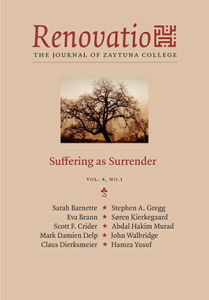Renovatio Journal 6 (Vol.4, No.1 Spring 2020): Suffering as Surrender

Editor-in-Chief: Hamza Yusuf
Publisher: Zaytuna College
Year of Publication: 2020
Print Length: 135 pages
Genre: Islamic Studies / Theology, Ethics and Philosophy; Hadith, Sunnah & Sirah, History, Science, Qur’anic Studies; Non-Fiction / Religious Studies
Topic: Allah ﷻ, Prophet Muhammad ﷺ, Muslim, Islam, Qur’an, Ethics & Morality, Suffering, Forgiveness, Grief, Happiness, Hope, Metaphysics; Religious Authority, Modernity, Modernism, Modern; Postmodernity, Postmodernism, Postmodern; Religion, Religious Thoughts & Philosophy
Renovatio (renovatio.zaytuna.edu) is a Muslim journal about the ideas that have shaped our past and present world. We ask scholars, theologians, and writers to examine timeless questions and today’s moral challenges by drawing from the enduring texts of revelatory faith traditions and current thinking from philosophy, theology, and ethics to history, politics, the social sciences, and beyond.
Vol.4 No.1: Suffering as Surrender
In the Vol. 4, No. 1 issue of Renovatio, our writers — from Muslim theologians, to Christian philosophers (past and present), to liberal artists — seek to explore and understand the link between suffering and submission to the reality of God’s existence.
Table of Contents
Contributors
1. A Dangerous Schooling – Søren Kierkegaard
Only when a person suffers and wills to learn from what he suffers does he come to know something about himself and about his relationship to God.
2. On Migrating to Lands of Melancholy – Abdal Hakim Murad
Those who migrate for worldly gain are likely to be miserably assimilated and crushed, while those whose intention is noble, who are willing to see and understand and heal, can serve a redemptive purpose.
3. King Lear and the Beautitudes – Scott F. Crider
Does the eternal horizon of reward help us more fully understand Lear’s suffering and subsequent transformation in Shakespeare’s tragedy?
4. How to Climb the Seven-Story Mountain – John Walbridge
Classics by Marcus Aurelius and Farīd al-Dīn ‘Aṭṭār, a thousand years apart, illustrate the spiritual journey.
5. The Freedom of Self-Sacrifice – Mark Damien Delp
Can we rediscover the ancient roots of moral action in the late-modern twilight of free will?
6. Myths versus Novels – Eva Brann
If myths and novels belong to different categories, do the fictional beings that reside in each have essential natures that make different demands of us, the consumers of imaginative works?
7. Suffering as Surrender – Hamza Yusuf
If we are righteous, pious servants of the Merciful and steward well our lives but still are stricken with calamities, then these are trials from God and we must surrender to Him.
8. The Only Real Solitude – Stephen A. Gregg
Solitude calls to mind experiences that differ widely, from the pain of isolation to the freedom of self-reliance. How then should we understand the nature of being alone?
9. From Humanistic to Mechanistic Economics—and Back? – Claus Dierksmeier
Implementing moral ideals in corporate settings necessarily requires us to dismiss the materialist pretensions of economics.
10. Conversing with One’s Self – Sarah Barnette
As individuals, we must all face and absorb pain, but could a regular habit of personal writing help nullify or transmute our experience of suffering?

Zaytuna College was founded in Berkeley, California, with a mission to educate and prepare morally committed professional, intellectual, and spiritual leaders who are grounded in the Islamic scholarly tradition and conversant with the cultural currents and critical ideas shaping modern society, through a traditional liberal arts education.
Source: https://zaytuna.edu/about
More from Zaytuna College in this library, click here.

Hamza Yusuf is president of Zaytuna College in Berkeley, California, the first accredited Muslim liberal arts college in the United States. A leading proponent of classical learning, the traditional liberal arts, and great books education in both the Western and Muslim traditions, he has translated, authored, and coauthored numerous publications, including scholarly books and articles as well as papers on major current areas of ethical concern. He holds traditional advanced degrees (ijazaat) in Islamic law and theology, as well as a BA in Religious Studies (San Jose State University) and a PhD from the Graduate Theological Union in Berkeley, California.
Source: https://sandala.org/pages/about-us
More from Hamza Yusuf in this library, click here.
